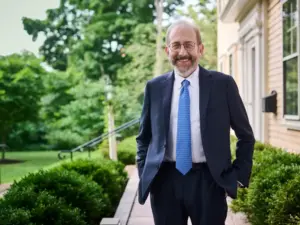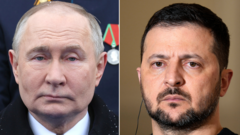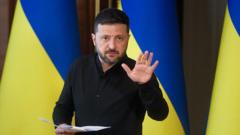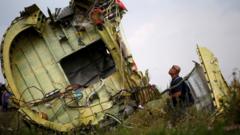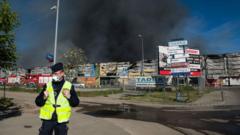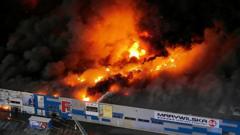The dynamics of the Russia-Ukraine war shift as Moscow asserts territorial advantage while engaging in complex diplomatic maneuvers aimed at achieving greater negotiating power.
**Russia Seeks Diplomatic Leverage Amid Battlefield Gains in Ukraine**

**Russia Seeks Diplomatic Leverage Amid Battlefield Gains in Ukraine**
As Moscow claims military successes, the Kremlin pushes for favorable terms in potential negotiations.
In the ongoing conflict between Russia and Ukraine, the battlefield developments have begun to shape the diplomatic landscape. President Vladimir Putin asserts that Russian forces have gained an upper hand, insisting the time is ripe for Moscow to secure advantageous negotiation terms as discussions of cease-fire talks emerge in Turkey this week.
In recent statements, Putin declared that Russia is poised to "finish off" Ukrainian resistance. He emphasized that the advantages gained on the frontlines justify the Kremlin's assertive diplomatic stance. Such sentiments were echoed by Andrei V. Kartapolov, the head of the defense committee in the Russian Parliament, who reiterated that Russian military efforts were advancing in "116 directions," thereby underscoring the geopolitical implications of their actions.
Amid these developments, uncertainty looms over whether Putin will attend the proposed peace talks, with Ukrainian President Volodymyr Zelensky openly challenging him to engage in person. This dynamic creates a tense atmosphere, particularly as U.S. officials navigate the seemingly inflated demands issued by Russian diplomats that appear disproportionately ambitious relative to the military achievements claimed on the ground.
The Kremlin's approach to the negotiation process has complicated the U.S. response, as officials evaluate how to balance support for Ukraine against Russia's aggressive posturing. While Russian forces have made tactical gains in recent weeks, their aspirations for total victory remain far from fulfilled, highlighting the complex realities at play in the ongoing war.
As both military actions and diplomatic undertones evolve, the situation remains fluid, with the world closely monitoring the developments that may influence the broader implications for stability in the region.
In recent statements, Putin declared that Russia is poised to "finish off" Ukrainian resistance. He emphasized that the advantages gained on the frontlines justify the Kremlin's assertive diplomatic stance. Such sentiments were echoed by Andrei V. Kartapolov, the head of the defense committee in the Russian Parliament, who reiterated that Russian military efforts were advancing in "116 directions," thereby underscoring the geopolitical implications of their actions.
Amid these developments, uncertainty looms over whether Putin will attend the proposed peace talks, with Ukrainian President Volodymyr Zelensky openly challenging him to engage in person. This dynamic creates a tense atmosphere, particularly as U.S. officials navigate the seemingly inflated demands issued by Russian diplomats that appear disproportionately ambitious relative to the military achievements claimed on the ground.
The Kremlin's approach to the negotiation process has complicated the U.S. response, as officials evaluate how to balance support for Ukraine against Russia's aggressive posturing. While Russian forces have made tactical gains in recent weeks, their aspirations for total victory remain far from fulfilled, highlighting the complex realities at play in the ongoing war.
As both military actions and diplomatic undertones evolve, the situation remains fluid, with the world closely monitoring the developments that may influence the broader implications for stability in the region.


